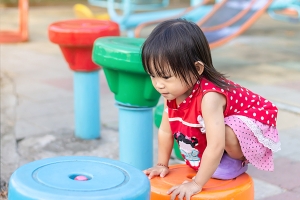
Teaching children how to do difficult things comes with parenting. We coach and encourage kids through frustration, tears and bursts of anger as they learn to tie shoes, write their names and ride a bike. We wouldn’t dream of holding them back because something appears to be too hard to tackle (right?). Instead, we mend scraped knees, reassure pounding hearts and beam along with them as children master each new skill.
Keeping this momentum going as kids grow is a great parental responsibility because the challenges children face grow right along with them—challenges that require kids to persevere, manage the stress and anxiety of life, and triumph over setbacks. Kids need to become resilient in order to keep trying when they want to give up, and parents can help.
Becoming resilient takes practice and just like learning to walk or ride a bike, it usually involves some pain and discomfort for both children and parents.
Every well-meaning parent knows it’s tough to not jump in when kids struggle. It starts small: Maybe there is a difficult playmate and it’s easier to just stop playing with him. Or a favorite toy is lost and a quick replacement stops the tears. We can fix the problem—and it feels good to fix things. Sometimes that’s the right decision.
But the stakes get higher as kids get older: We might find ourselves over-helping with difficult homework, requesting teachers who aren’t too tough, and rushing forgotten lunches or assignments to school to avoid anxiety, embarrassment or negative consequences.
Our intentions are good, but rescuing (and too much help) sends kids the wrong message. Instead of “You’ve got this! I believe in you!” these actions communicate, “You can’t handle hard things.” When children begin believing this, our efforts to reduce their anxiety can backfire.
Erica Rood, MA, Ed. who works with parents, teens and preteens at Inspire Balance Coaching in Del Mar says, “When teens have not developed resilience, they tend to give up quickly and easily. They tend to catastrophize and feel helpless in the face of a perceived catastrophe. Instead of seeing a challenge as an opportunity for growth and a temporary circumstance, they freeze or feel their world is crashing down. They can develop anxiety and depression.”
Children who are allowed to experience hard things with the supportive coaching of parents and other loving adults learn to believe in their ability to figure out challenges. They see themselves as smart, strong, problem-solvers who know how to manage feelings and how to ask for help when needed.
“Fostering resilience in younger children is essential,” says Rood, “so as they enter the teen years, they have a strong sense of who they are and what they value, they have an ability to cope and learn from challenges, and they have tools for handling life’s ups and downs with ease and confidence.”
Kids of all ages can learn how to navigate through tough moments when parents give them age-appropriate opportunities to practice. Start looking for ways to give your little ones chances to exercise resilience. The next time there is a conflict with a friend, give them space to work it out themselves. Encourage them to stay engaged and work together to find a resolution. You might be surprised at how resourceful even the youngest children can be when given time to come up with their own solutions.
As kids grow, talk about ways to communicate with difficult people and what to do instead of blaming others for being demanding or unfair. Difficult people and unfair situations are a reality of life. Help kids understand that we can’t change the way others treat us, but we can choose how we respond. Teach them how to ask good questions to clarify expectations and practice how to speak up respectfully.
Include older children in decision-making and develop strategies together on how to manage time for homework, family time and outside activities. Help them identify healthy ways to self-sooth when they’re feeling overwhelmed, anxious or stressed.
At every age, help kids brainstorm questions such as:
- What are some of the ways you’ve thought of to handle this?
- What’s worked in the past when you’ve felt this way?
- Could you use some help coming up with more ideas?
Set aside time after tough situations to talk about what your child learned, where they found help, and what they might do differently next time.
Parents can help kids become resilient by finding ways for children to learn how strong and capable they are. Nurture resilience at every age with actions that say you believe in them; then watch as kids grow to become confident teens and adults who are prepared to triumph over life's challenges.
Food for thought: What is a challenge you’ve been shielding your child from that could be an opportunity for growing resilience?
Jody Lee Cates is a local mom and blogger who writes about healthy relationships at www.jodyleecates.com
_______________















